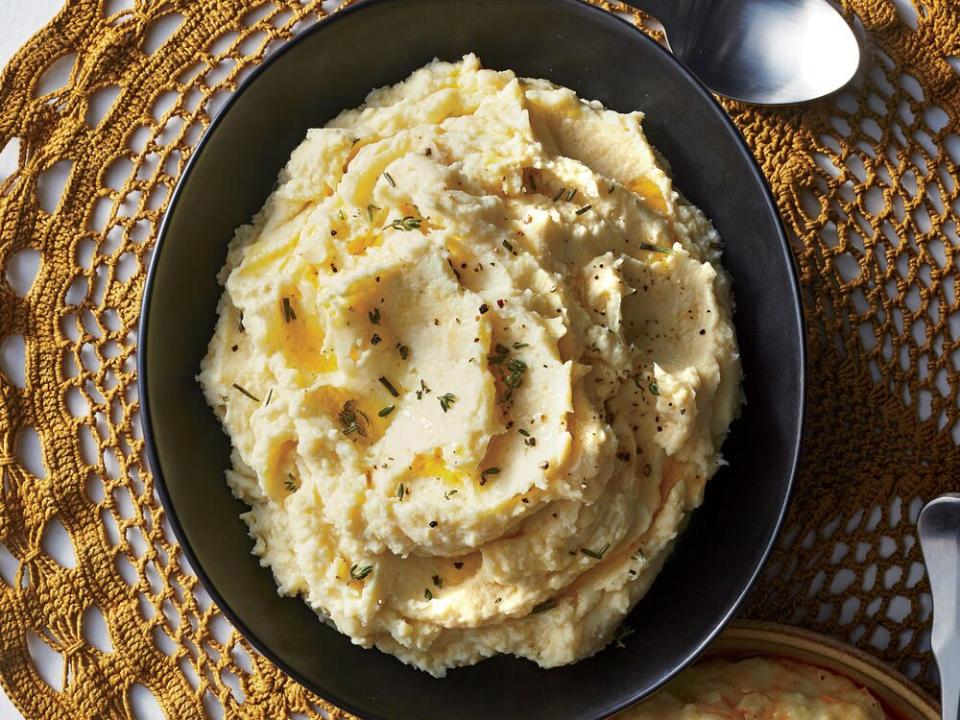How Long Should You Boil Potatoes for Mashing?
Mashed potatoes are incredibly simple and satisfying to make. However, there are a few things to consider before you start mashing. Here’s what you need to know about making mashed potatoes, from choosing the best spuds to how long to boil them:
Best Potatoes for Mashed Potatoes

Yukon gold. The Yukon gold is the ideal mashing potato. Its natural buttery taste puts it ahead of the curve, but what really seals the deal is the Yukon gold’s dense texture. The rarely grainy or watery potato is easy to cook to a perfect creamy consistency.
Russet. Russet potatoes, likely the most popular choice for mashing, are extremely starchy. On one hand, this is a good thing—the potato is a starch, after all. On the other hand, this means they absorb a lot of water. When prepared correctly, the russet makes for a delightfully light and fluffy product. However, it’s easy to whip them too hard and turn them into a paste-like concoction.
In an ideal world, all mashed potatoes would be made with a blend of Yukon golds and russet potatoes. If you must choose one, however, we recommend stocking up on just Yukon golds for mashing. Save your russets for baking.
Get the recipe: Creamiest Mashed Potatoes
How Long to Boil Potatoes for Mashing
WATCH: 6 Uses For Leftover Mashed Potatoes
How long you should boil potatoes you plan to mash depends on how large the potatoes (or potato pieces) you’re using are.
Some people prefer to boil their potatoes whole, while others prefer to cut the vegetables into pieces before boiling.
Smaller potatoes (like red gold) will cook faster whole—about 15-20 minutes in boiling water. Larger potatoes (like russet) take a little more time—about 20-30 minutes.
If you’re opting to cut your potatoes into cubes first, you can probably get by with about 15 minutes in boiling water no matter what size potato you started with.
While there’s not a set amount of boiling time you can always count on for perfect mashed potatoes, a good rule of thumb is to make sure their cooked all the way through. To test this, pierce a potato with a fork. If the fork easily slides all the way through the other side, it’s cooked thoroughly.
Read more: The Brilliant Secret to Making Better Mashed Potatoes
How to Make Mashed Potatoes

1. Prepare your potatoes.
No matter what you’ve been told, it’s not necessary to peel potatoes before boiling (if you’re boiling them whole). Not only do unpeeled potatoes absorb less water and retain more vitamins and nutrients, the peels are usually easier to remove after cooking—just make sure you scrub the skin well first if this is the route you plan to take.
That said, you can totally peel the potatoes first if that’s what you’re most comfortable with. A potato peeler or classic paring knife will do the trick.
If you want, you can also cube or quarter the potatoes if you want to speed up the cooking time.
2. Boil your potatoes in generously salted water.
Place the potatoes in a pot or large pan filled with salted, cold water. The potatoes should be completely submerged. Bring the water to a boil, then reduce the heat to low or medium. When you can easily pierce the potatoes all the way through with a fork, they’re done.
Also, we’re not kidding when we say you should be heavy-handed with your salt shaker (about a tablespoon per pound of potatoes). You’ve got to use more than you probably think is necessary to get the seasoning inside the potato.
3. Drain potatoes in a colander.
Make sure those suckers are dry before you start mashing to avoid a soggy, all-around unpleasant dining experience.
4. Mash the potatoes
Use a potato masher, ricer, or food mill to mash the potatoes. What you use or how much you mash depends entirely on the recipe you’re using. Follow the instructions to a T for best results.
5. Add hot butter and warm milk, buttermilk, or half-and-half to the mixture.
Again, read your recipe for specifics.
6. Season with more salt (if needed), pepper, and/or fresh herbs.
Season the potatoes to taste. There’s really no right or wrong way to finish off the dish—but we recommend topping it with more butter, chives, or fresh rosemary.
Read more: 7 Mashed Potato Mistakes Everyone Makes
Mashed Potato Recipes

Ready to try your hand at perfect mashed potatoes? We’ve got you covered:
Hungry for more? Check out our best mashed potato recipes here.

